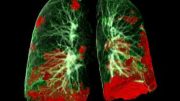
Hospitalization for COVID-19 linked to greater risk of later readmission or death.
Large study in England suggests need for increased monitoring of COVID-19 patients after discharge.
A large study conducted in England found that, compared to the general population, people who had been hospitalized for COVID-19—and survived for at least one week after discharge—were more than twice as likely to die or be readmitted to the hospital in the next several months. Krishnan Bhaskaran and colleagues from the London School of Hygiene and Tropical Medicine, University of Oxford and clinical software provider TPP present these findings in the open-access journal PLOS Medicine.
Previous research has suggested that people with COVID-19 may face a greater risk of health issues for several months following their initial infection. However, evidence on this topic remains limited.
To help clarify long-term health risks for people with COVID-19, Bhaskaran and colleagues focused on those who had been hospitalized for the disease. The researchers conducted a statistical analysis of electronic health records from the database OpenSAFELY, evaluating data on nearly 25,000 patients who had been discharged after being hospitalized for COVID-19 in 2020, and for comparison, more than 100,000 members of the general population.
The analysis showed that, compared to the general population, people who had been hospitalized for COVID-19 and lived for at least one week after discharge had twice the overall risk of hospital readmission or death in subsequent months. They also faced nearly five times the risk of death from any cause.
In order to account for risks after hospitalization for an infectious disease, the researchers also considered data from more than 15,000 people who had been hospitalized for influenza in 2017-19. Statistical analysis found that, compared to the influenza patients, COVID-19 patients faced a slightly lower combined risk of hospitalization or death overall. However, people who had been hospitalized for COVID-19 had a greater risk than influenza patients of death from any cause, a greater risk of hospital readmission or death resulting from their initial infection, and a greater risk of death due to dementia.
Overall, these findings align with other research showing increased risks of subsequent health issues for people who have had COVID-19. The authors suggest these risks could be mitigated by policies to increase monitoring of COVID-19 patients after discharge and to raise awareness of potential complications.
Bhaskaran adds, “Our findings suggest that people who have had a severe case of COVID-19 requiring a hospital stay are at substantially elevated risk of experiencing further health problems in the months after their hospitalization; it is important that patients and their doctors are aware of this so that any problems that develop can be treated as early as possible. Our findings also highlight the importance of getting vaccinated, which is the best tool we have for preventing severe COVID-19 in the first place.”
Reference: “Overall and cause-specific hospitalisation and death after COVID-19 hospitalisation in England: A cohort study using linked primary care, secondary care, and death registration data in the OpenSAFELY platform” by Krishnan Bhaskaran, Christopher T. Rentsch, George Hickman, William J. Hulme, Anna Schultze, Helen J. Curtis, Kevin Wing, Charlotte Warren-Gash, Laurie Tomlinson, Chris J. Bates, Rohini Mathur, Brian MacKenna, Viyaasan Mahalingasivam, Angel Wong, Alex J. Walker, Caroline E. Morton, Daniel Grint, Amir Mehrkar, Rosalind M. Eggo, Peter Inglesby, Ian J. Douglas, Helen I. McDonald, Jonathan Cockburn, Elizabeth J. Williamson, David Evans, John Parry, Frank Hester, Sam Harper, Stephen JW Evans, Sebastian Bacon, Liam Smeeth and Ben Goldacre, 25 January 2022, PLOS Medicine.
DOI: 10.1371/journal.pmed.1003871
Funding: This work was jointly funded by UKRI, NIHR and Asthma UK-BLF [COV0076; MR/V015737/] and the Longitudinal Health and Wellbeing strand of the National Core Studies program. The OpenSAFELY data science platform is funded by the Wellcome Trust. TPP provided technical expertise and infrastructure within their data center pro bono in the context of a national emergency. KB holds a Senior Research Fellowship from Wellcome (220283/Z/20/Z). RME is funded by HDR UK (grant: MR/S003975/1) and MRC (grant: MC_PC 19065). RM holds a Sir Henry Wellcome fellowship funded by Wellcome. The funders had no role in study design, data collection and analysis, decision to publish, or preparation of the manuscript.









Be the first to comment on "Greater Risk of Death: Need for Increased Monitoring of COVID-19 Patients After Discharge"